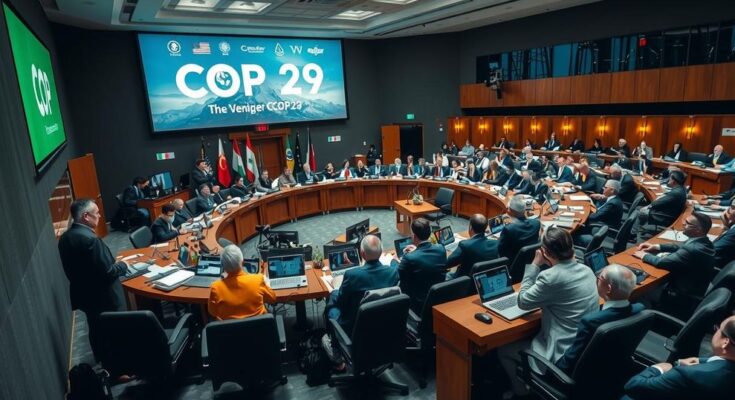At COP29 in Baku, world leaders, including Prime Ministers from Croatia, Greece, Pakistan, and the Bahamas, discussed the severe impacts of climate change. Key themes include urgent climate action, candid discussions about economic trade-offs, and a focus on climate finance, particularly for developing nations. Absences of major emitters raised concerns, while the U.K. announced an ambitious emissions target for the future.
At the United Nations’ COP29 climate conference in Baku, Azerbaijan, numerous world leaders are poised to address the urgent realities of climate change. As catastrophic events such as severe floods and unprecedented heatwaves afflict various nations, leaders like Croatia’s Prime Minister Andrej Plenkovic emphasize the critical nature of these challenges. Plenkovic reiterated, “The Mediterranean, one of the most vulnerable regions, calls for urgent action.” The Greek Prime Minister also highlighted the need for a candid discussion regarding necessary trade-offs in efforts to combat climate change. He pointed out the difficult choices that lie ahead regarding economic competitiveness and environmental sustainability, stating, “We need to ask hard questions about a path that goes very fast, at the expense of our competitiveness…” Additionally, Prime Minister Shehbaz Sharif of Pakistan addressed the severe impacts stemming from climate-related disasters, including deadly floods linked to increased monsoon intensity attributed to climate change. Meanwhile, Prime Minister Philip Edward Davis of the Bahamas underscored the financial ramifications of climate-related disasters in his country, which has struggled with debt due to such events. Today’s discussions are particularly focused on climate finance, urging wealthier nations to provide financial support to developing nations grappling with the repercussions of climate change. Notably absent from this crucial gathering is a significant contingent of major carbon emitters, including the greatest polluting nations such as China and the United States. British Prime Minister Keir Starmer made an impactful statement by committing to an ambitious emissions reduction target of 81% by 2035 compared to 1990 levels, exceeding the previously pledged 78%. This conference seeks to unite global voices in addressing the complexities of climate adaptation and mitigation initiatives, an endeavor that is critically needed as the effects of climate change continue to escalate.
The COP29 climate talks bring together leaders from around the globe to confront the increasing challenges posed by climate change. With extreme weather events such as floods and heatwaves becoming more frequent, leaders are gathering to share their experiences and advocate for enhanced global cooperation in tackling these urgent issues. Significant focus is placed on climate finance, particularly regarding the obligations of wealthier nations to support developing countries adversely affected by climate catastrophes, aiming to assist them in transitioning to sustainable practices and adapting to new environmental realities.
In conclusion, COP29 serves as a critical platform for nations to address the realities of climate change and advocate for collaborative solutions. The urgent calls for action from leaders around the world emphasize the need for immediate financial support for vulnerable countries and a concerted effort to reduce emissions on a global scale. The notable absence of major emitting countries raises questions about collective commitment but underscores the determination of other nations to push forward with climate initiatives regardless.
Original Source: www.bostonglobe.com




